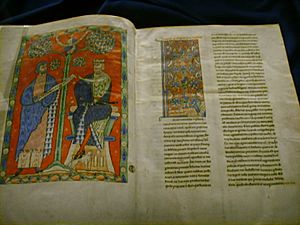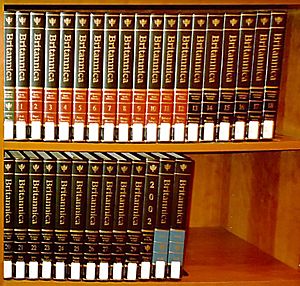Encyclopedia facts for kids
An encyclopedia is a big collection of information. It can be a set of books or a website. Encyclopedias help us learn about many different topics. They are like a huge library of facts, all organized so you can find what you need easily.
For a long time, all encyclopedias were printed as books. But now, most encyclopedias are found online on the Internet. The largest encyclopedia in English is English Wikipedia, which has millions of articles. Another very famous one is the Encyclopædia Britannica, which used to be the biggest printed encyclopedia.
Contents
How Encyclopedias Started
People have been trying to collect all knowledge for thousands of years. One of the earliest famous collections was Natural History by Pliny the Elder. He wrote it almost 2,000 years ago!
The word "encyclopedia" came into use in the 16th century. It means "complete knowledge." A very important early encyclopedia was the French Encyclopédie by Denis Diderot. It was special because many different people from all over the world helped write parts of it.
After the printing press was invented, it became easier to make many copies of books. Some dictionaries started to include very long definitions, almost like short articles. These were sometimes called encyclopedias. For example, a dictionary about science might have essays on different science topics. Later, encyclopedias began to put articles on many different subjects in alphabetical order. This made them much easier to use.
Big companies like Britannica were created just to publish encyclopedias. They hired many experts to write and check the articles. Today, some online encyclopedias let people who pay for a subscription add articles. Other online encyclopedias, like Wikipedia, let anyone contribute, even if they don't pay or sign in.
Different Kinds of Encyclopedias
There are many types of encyclopedias. Some are general, meaning they cover almost every topic you can imagine. The English Encyclopædia Britannica is a good example of a general encyclopedia. The German Brockhaus is another.
Other encyclopedias focus on specific topics. For instance, you can find encyclopedias just about medicine or philosophy. There are also encyclopedias that cover many topics but from a certain point of view. For example, Conservapedia presents information from a conservative viewpoint.
Some online encyclopedias are made especially for kids, like Kiddle. These use simpler language and focus on topics that are interesting and safe for younger readers.
How Encyclopedias are Organized
Most printed encyclopedias are organized in one of two main ways:
- Alphabetical order: This is the most common way. Articles are listed from A to Z, just like words in a dictionary. This makes it easy to find a specific topic quickly.
- By categories: Some encyclopedias group articles by subject, like "Animals," "History," or "Science."
Many dictionaries also contain information similar to encyclopedias, especially if they have long definitions or explanations.
Famous Encyclopedias You Might Know
Here are some examples of encyclopedias:
- This website, Kiddle
- Citizendium
- Encyclopædia Britannica
- Everipedia
- Funk & Wagnalls New Encyclopedia
- The Columbia Encyclopedia
Images for kids
-
Isidore of Seville, author of Etymologiae (10th. century Ottonian manuscript)
See also
 In Spanish: Enciclopedia para niños
In Spanish: Enciclopedia para niños






